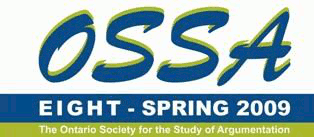
Location
University of Windsor
Document Type
Paper
Start Date
3-6-2009 9:00 AM
End Date
6-6-2009 5:00 PM
Abstract
One of the basic metatheoretical premises of pragma-dialectics is that “Argumentation has the general function of managing the resolution of disagreement.” (p.277) From a Peircean perspective this is at best a partial truth. While it may be correct that in concrete, finite contexts, argumentation may function to manage the resolution of disagreement, in the long run argumentation will tend towards the Truth (in a Peircean pragmatic sense). Using Peirce as my compass, I will take argumentation to refer to the resolution function of thought contingently situated and finitely understood (aimed at the settlement of belief). I will take argument to mean any structure or process which can serve as a real, compelling constraint upon thought in general. I will show that while the particular function of argumentation may be managing the resolution of disagreement, when situated within a Peircean-styled realism (where the universe has the form of an argument), argumentation will tend in the long run toward the Truth (as the end of argumentation in general). I will end by showing that while argumentation may have a resolution function, its real measure and normative standard is growth (epistemic, moral, political and otherwise) rather than resolution per se.
Creative Commons License

This work is licensed under a Creative Commons Attribution 4.0 International License.
Response to Submission
Joseph A. Novak, Commentary on Rose
Reader's Reactions
Joseph A. Novak, Commentary on Rose (June 2009)
Included in
The Universe as an Argument: Argumentative function—a Peircean orientation
University of Windsor
One of the basic metatheoretical premises of pragma-dialectics is that “Argumentation has the general function of managing the resolution of disagreement.” (p.277) From a Peircean perspective this is at best a partial truth. While it may be correct that in concrete, finite contexts, argumentation may function to manage the resolution of disagreement, in the long run argumentation will tend towards the Truth (in a Peircean pragmatic sense). Using Peirce as my compass, I will take argumentation to refer to the resolution function of thought contingently situated and finitely understood (aimed at the settlement of belief). I will take argument to mean any structure or process which can serve as a real, compelling constraint upon thought in general. I will show that while the particular function of argumentation may be managing the resolution of disagreement, when situated within a Peircean-styled realism (where the universe has the form of an argument), argumentation will tend in the long run toward the Truth (as the end of argumentation in general). I will end by showing that while argumentation may have a resolution function, its real measure and normative standard is growth (epistemic, moral, political and otherwise) rather than resolution per se.
